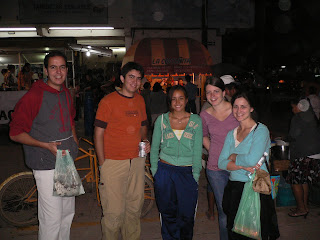Last weekend a friend was walking me to my car, wheeling along his bicycle so that we'd be going at the same pace. It was late, it was freezing, and the two blocks to my car seemed endless. Then I saw that my friend's bike had a flat rack over the back tire. I remembered that I used to ride on the back of friends' bikes all the time in China. My friend had never tried this and was kind of scared the balance wouldn't work out, but I told him to start riding slowly and I'd hop on...if I still remembered how.
Fortunately, I did remember. The movement came back to me as muscle memory took over--I even managed to maneuver around my friend's backpack and sit down without shaking his balance. I guess in addition to never forgetting how to ride a bike, you also never forget how to ride side saddle on the back of a bike. With a few steps, and the quick hop-hop I took to get me ready to jump up while maintaining some forward momentum, I was overwhelmed by a visceral memory of living in China. I often hear about songs or smells transporting you to another time or place, but I rarely think of movement having that power...but it did. That's kind of a fun interpretation of muscle memory - not only does your brain tell your muscles to remember what to do, but your muscles doing something can tell your brain to remember something.
I went online to find a picture of someone biking side saddle for my headline picture, and I finally found one on an interesting posting about bikers in Amsterdam. Then I remembered that I have some interesting photos of weird bikes in China. Most of them, as you will see below, are resourceful re-workings of bikes to function as a business on wheels, but some are also of everyday commuters.
Amsterdam Bicycle Site, if you're interested:
http://www.ski-epic.com/amsterdam_bicycles/
rural bike
city bikes
three-wheeled taxi bike
your favorite blogger on a bike
furniture delivery bike
mesh delivery bike, actually mesh delivery cart
recycle bike
huge chunks of coal bike
vegetable seller bike
bike repair shop bike
cleaning supplies bike
yes, that's a baby napping in a bike




































